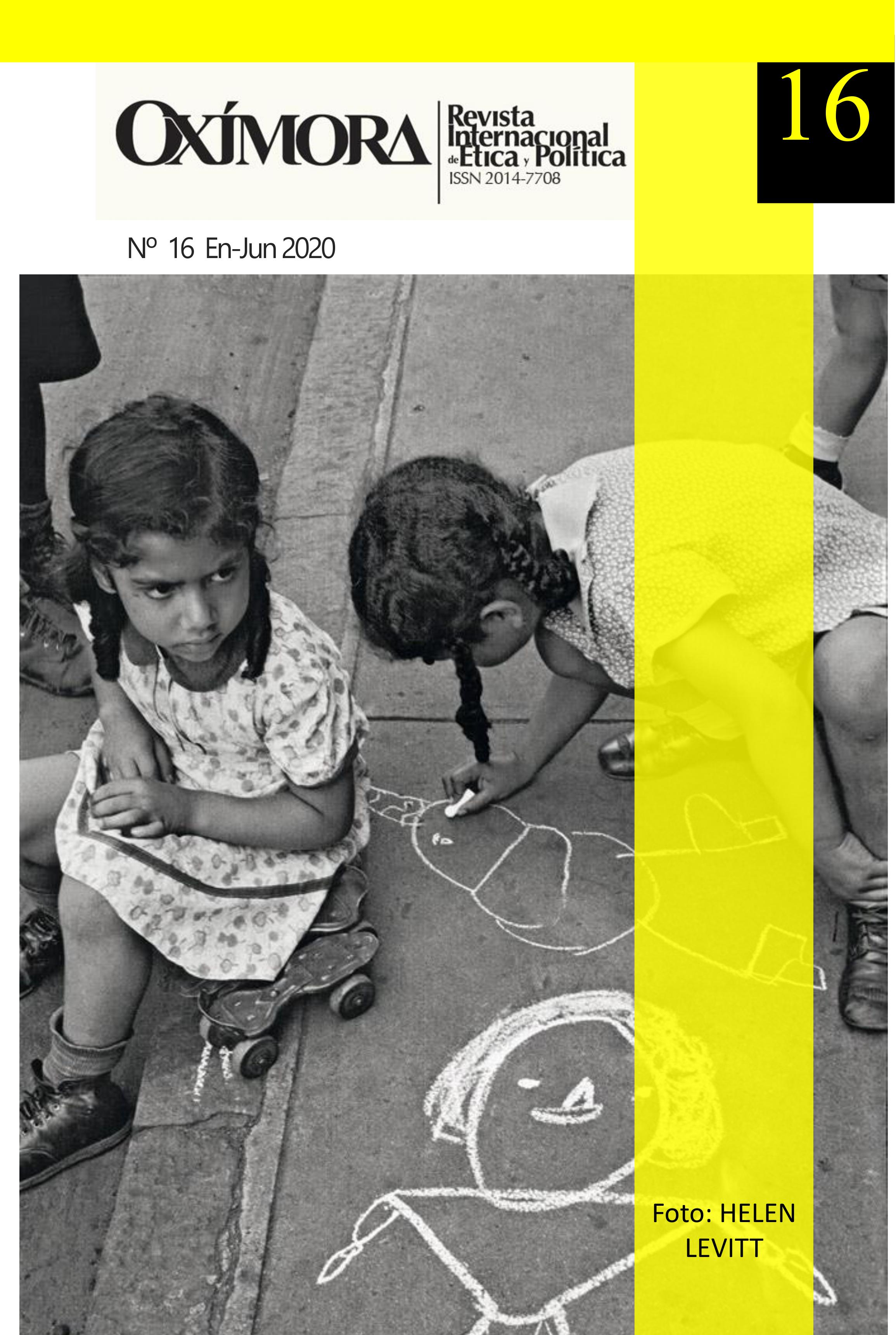El desarrollo dialógico de la argumentación moral y sus relaciones con la ética del discurso
DOI:
https://doi.org/10.1344/oxi.2020.i16.30383Paraules clau:
Dialógica, Lógica dinámica, Argumentación moral, Ética del discurso, Habermas.Resum
Retornando al modelo dialógico del discurso racional en la lógica dialógica y en la teoría comunicativa de Habermas, describimos la lógica dinámica como el estudio del flujo general de la comunicación (pragmática). Mostramos cómo estas dos perspectivas estarían relacionadas con la teoría de los actos de habla y sus relaciones con la teoría moral. Esperamos que el presente trabajo contribuya a una mejor comprensión de la argumentación moral y sus relaciones con la ética del discurso.
Referències
ADDISON, John W, HENKIN, Leon y TARSKI, Alfred. (1965). The Theory of Models. Amsterdam: North-Holland.
ANDERSON, Perry. (2013). Tras las huellas del materialismo histórico. Madrid: Editorial Siglo XXI.
APEL, Karl-Otto. (1973). Transformation der Philosophie: Band II. Das Apriori der Kommunikationsgemeinschaft. Frankfurt: Suhrkamp.
AUSTIN, John L. (1962). How to do things with words. Oxford: Oxford University Press.
CORTINA, Adela. (2010). Ética mínima. Introducción a la filosofía práctica. Madrid: Tecnos.
DÍEZ, José A. y ULISES MOULINES, Carlos. (2016). Fundamentos de filosofía de la ciencia. Barcelona: Editorial Ariel.
DRYZEK John S. (1995). “Political and ecological communication”. Environmental Politics, 4, pp. 13-30.
______________. (2000). Deliberative democracy and beyond: liberals, critics and contestations. Oxford: Oxford University Press.
______________. (2010). Foundations and frontiers of deliberative democracy. Oxford: Oxford University Press.
FOUCAULT, Michel. (2014). El orden del discurso. Barcelona: Tusquets Editores.
GARCÍA MARZÁ, V. Domingo. (1992). Ética de la justicia. Madrid: Tecnos.
GÓMEZ-HERAS, José María. (2003). Teorías de la moralidad. Introducción a la ética comparada. Madrid: Editorial Síntesis.
HABERMAS, Jürgen. (1981). Theorie des kommunikativen Handelns. Band 1: Handlungsrationalität und gesellschaftliche Rationalisierung. Frankfurt: Suhrkamp.
_________________. (1983a). Moralbewußtsein und kommunikatives Handeln. Frankfurt: Suhrkamp.
__________________. (1983b). La reconstrucción del materialismo histórico. Madrid: Taurus.
___________________. (2000). Aclaraciones a la ética del discurso. Madrid: Editorial Trotta.
___________________. (2008). Pensamiento postmetafísico. México: Taurus.
__________________. (2011a). Teoría de la acción comunicativa: complementos y estudios previos. Madrid: Cátedra.
___________________. (2011b). Verdad y justificación. Madrid: Editorial Trotta.
HINTIKKA, Jaako y SANDU, Gabriel. (2006). “What is logic?”, en Jacquette, Dale (ed.), Philosophy of Logic (Handbook of the Philosophy of Science). Amsterdam: Elsevier, pp. 13-39.
HODGES, Wilfrid. (1986). “Truth in a structure”. Proceedings of the Aristotelian Society, 86, pp. 135-151.
KANT, Immanuel. (2002). Fundamentación para una metafísica de las costumbres. Madrid: Alianza Editorial.
LORENZEN, Paul. (1955). Einführung in die operative Logik und Mathematik. Berlin: Springer.
_______________. (1969). Normative logic and ethics. Manheim: Bibliographisches Institut.
LORENZEN, Paul y LORENZ, Kuno. (1978). Dialogische Logik. Darmstadt: Wissenschaftstheorie Buchgesellschaft.
MANZANO, María. (1989). Teoría de Modelos. Madrid: Alianza Editorial.
MARTIN-LÖF, Per. (1996). “On the meanings of the logical constants and the justifications of the logical laws”. Nordic Journal of Philosophical Logic, 1, pp. 11-60.
MOSTERÍN, Jesús. (2000). Los lógicos. Madrid: Espasa Calpe.
NIEMEYER, Simon. (2019). “Intersubjetive Reasoning in Political Deliberation. A Theory and Method for Assessing Deliberative Transformation at Small and Large Scale”. Consultado el 22 de diciembre de 2019. Centre for Deliberative Democracy and Global Governance, en https://www.governanceinstitute.edu.au/magma/media/upload/ckeditor/files/Intersubjective%20Reasoning(4).pdf
RAHMAN, Shahid y KEIFF, Laurent. (2005). “On how to be a dialogician? A short overview on recent developments on dialogues and games”, en Vanderveken, Daniel (ed.), Logic, thought and action. Dordrecht: Springer, pp. 359-408.
RAHMAN, Shahid, STREET, Tony y TAHIRI, Hassan. (2008). The unity of science in the arabic tradition: science, logic, epistemology and their interactions. Dordrecht: Springer.
RAHMAN, Shahid y REDMOND, Juan. (2016). “Armonía dialógica: tonk, Teoría constructiva de Tipos y reglas para jugadores anónimos”. Theoria, 31, pp. 27-53.
REDMOND, Juan y FONTAINE, Matthieu. (2011). How to play dialogues. An introduction to dialogical logic. London: College Publications.
REDMOND, Juan y LÓPEZ-ORELLANA, Rodrigo. (2018). “Lógica clásica y esquizofrenia: por una semántica lúdica”. Revista de Filosofía, 74, pp. 215-241.
ROMERO, Javier. (2020). “Biosemiótica. Hacia una teoría general de los signos de la naturaleza humana y no humana”, Signa. Revista de la Asociación Española de Semiótica, nº 29, (en imprenta).
ROMERO, Javier y MEJÍA FERNÁNDEZ, Ricardo. (2019). “La teoría antropológica de Jürgen Habermas: un naturalismo débil entre Kant y Darwin”, Cuadernos salmantinos de filosofía, 46, pp. 113-140.
SEARLE, John. (1969). Speech acts. An essay in the philosophy of language. Cambridge: Cambridge University Press.
ULISES MOULINES, Carlos. (1996). “Las ideas básicas del estructuralismo metacientífico”. Revista de Filosofía, 16, pp. 93-104.
VAN BENTHEM, Johan. (1991). “General dynamics”. Theoretical Linguistic, 17, pp. 159-201.
____________________. (2006a). “Adiós a la soledad: modas dinámicas en la lógica actual”. Azafea. Revista de filosofía, 8, pp. 21-33.
____________________. (2006b). “Where is logic going, and should it?”. Topoi, 25, pp. 117-122.
____________________. (2011). Logical dynamics of information and interaction. Cambridge: Cambridge University Press.
____________________. (2014). Logic in games. Cambridge MA: The MIT Press.
WITTGENSTEIN, Ludwig. (1953). Philosophical Investigations. Oxford: Basil Blackwell.
Descàrregues
Publicades
Com citar
Número
Secció
Llicència
a) El/la autor/a conserva los derechos de autoría, otorgando a la revista el derecho de primera publicación de la obra.
b) Los textos se difundirán con la licencia de reconocimiento de Creative Commons (CC BY) que permite compartir la obra con terceros, siempre que estos reconozcan su autoría, su publicación inicial en esta revista y las condiciones de la licencia.



